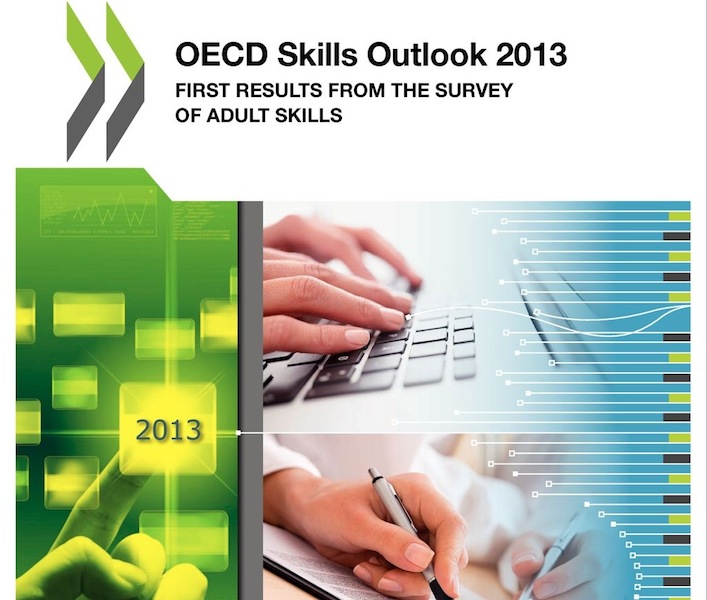Q. What skills are required in order to be employed and receive relatively high wages in the 21st century?
A. You mean, other than blindly furious industriousness, continuous calculation of one’s self-interest, being raised by wealthy parents, and having good luck amidst the crises produced by neoliberal mismanagement of the economy?
According to the new OECD Skills Outlook 2013, key capacities for economic success in the 21st century include information-processing competencies defined in terms of proficiency in literacy, numeracy and problem-solving in technology-rich environments. These abilities have become crucial, first, because of the expanding availability of computers; second, because ICTs (information and communication technologies) are changing how services are supplied and utilized, for example, the substantial growth of e-commerce; and third, because employment in knowledge-oriented work is increasing. Occupations with a substantial focus on data analysis, such as finance, real estate, insurance and business services, have been among the most rapidly growing sectors of the economy, while other sectors, even if, like agriculture, characterized by low-skilled labour, have incorporated various forms of computerization.
The OECD report notes a number of interesting statistics: Finland and Japan have the highest shares of information processing skill; that is, one in every fifth person has high skill, whereas in Spain and Italy it is only one in 20. In terms of literacy, 12 per cent of U.S. adults attain the highest levels (Level 4/5) which is consistent with the average across OECD countries, whereas Japan and Finland at 22 per cent score highest. In terms of numeracy, 8 per cent of U.S. adults reached Level 4/5 compared with an OECD average of 13 per cent and a 19 per cent score in Japan and Finland. In terms of problem-solving in technology-rich environments, 31 per cent of U.S. adults completed Level 2 or higher which was below the 34 per cent average across countries. The Netherlands and Finland graded highest with 42 per cent of their adults achieving Level 2 or higher. Socio-economic background does not have a strong impact on adult literacy in Japan, the Netherlands, Sweden or Norway but it has a very strong impact on literacy in the United States. In the U.S. the likelihood of being low-skilled are ten times greater among those born to low-educated parents than among those born to high-educated parents. This statistic is drastically worse than in other countries.
The report also noted that 21st-century workers do not just need to be adept at information-processing, but must also possess “generic” abilities, such as interpersonal communication, self-management, and the ability to learn, “to help them weather the uncertainties of a rapidly changing labour market.” What is also crucial for examination is the importance of developing workers’ capacities for collective advocacy. It is these latter capabilities that have prevented a poor socio-economic background — in Japan, the Netherlands, Sweden and Norway — from inhibiting the development of information-processing expertise among large sectors of their populations.
When studying these competencies, it is not only misguided but ironic to confuse correlation and causation — and this misguided vision is exactly what the OECD is perpetrating with this report. Do information-processing skills make countries successful, or do successful countries produce (or, as has often been the approach in the United States, import) these skills? The OECD would do well to observe that countries with strong labour legislation, unions and social movements have strong incomes and strong education — as well as more people who know how to calculate a tip at a restaurant and interpret data.
Thomas Ponniah is an Affiliate of the David Rockefeller Center for Latin America Studies and an Associate of the Department of African and African-American Studies at Harvard University.



